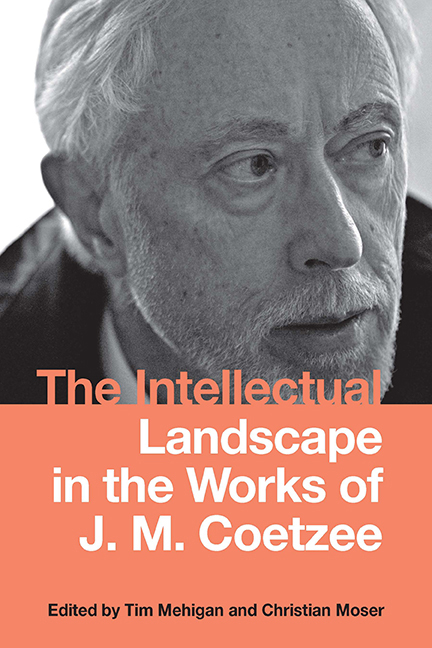Book contents
- Frontmatter
- Contents
- Acknowledgments
- Introduction: Coetzee's Intellectual Landscapes
- Part I Truth and Justification
- 1 J. M. Coetzee on Truth, Skepticism, and Secular Confession in “The Age We Live In”
- 2 Social Order and Transcendence: J. M. Coetzee's Poetics of Play
- 3 Autobiography and Romantic Irony: J. M. Coetzee and Roland Barthes
- 4 The Semantics of Barbarism in J. M. Coetzee's Novel Waiting for the Barbarians
- 5 In the Heart of the Empire: Coetzee and America
- Part II Objectivity and Communication
- Part III Convergence of Interpretative Horizons and Moral Solidarity
- Notes on the Contributors
- Index
3 - Autobiography and Romantic Irony: J. M. Coetzee and Roland Barthes
from Part I - Truth and Justification
Published online by Cambridge University Press: 03 July 2019
- Frontmatter
- Contents
- Acknowledgments
- Introduction: Coetzee's Intellectual Landscapes
- Part I Truth and Justification
- 1 J. M. Coetzee on Truth, Skepticism, and Secular Confession in “The Age We Live In”
- 2 Social Order and Transcendence: J. M. Coetzee's Poetics of Play
- 3 Autobiography and Romantic Irony: J. M. Coetzee and Roland Barthes
- 4 The Semantics of Barbarism in J. M. Coetzee's Novel Waiting for the Barbarians
- 5 In the Heart of the Empire: Coetzee and America
- Part II Objectivity and Communication
- Part III Convergence of Interpretative Horizons and Moral Solidarity
- Notes on the Contributors
- Index
Summary
ONE OF THE FOUNDING CONCEPTS in modern autobiography is the understanding that autobiographical truth is connected to the ideal of sincerity. So much in modern autobiography has its origins in Rousseau's Confessions, particularly through the idea that autobiographical writing is fundamentally an act of persuasion, one that persuades an audience that it embodies a sincere realization of the self. “Rousseau's interest,” Jean Starobinski has argued, “begins with the question: Why does this inner feeling … not find its echo in the according of immediate recognition?” And Rousseau's text, Starobinski continues, therefore must convey a voice “supple enough and varied enough to tell the diversity, the contradictions, the slight details, the miniscule nuances, the interlocking of tiny perceptions whose tissue constitutes the unique existence of Jean-Jacques.” There is much that distances Rousseau from contemporary autobiographical writing, and there are of course very different ways of interpreting Rousseau's significance as a confessional writer. But the notion that the task of autobiography is to establish a written presence capable of winning recognition as uniquely his or her own finds its equivalent in the injunction repeatedly made by life-writing instructors on MFAs to “find your voice,” to create the persona that is you. As Vivian Gornick explains in The Situation and the Story, a how-to guide that accompanies her MFA course, successful autobiographies derive from “an insight that organized the writing, and in each case a persona had been created to serve the insight.”
The challenge to this assumption dates back almost as far as the Confessions themselves. Examples of an “other tradition,” to borrow John Ashbery's phrase, that connects autobiographical truth with the capacity to shake off the voice of sincerity and treat the self ironically as a fiction, can be found throughout modern literature, in texts as diverse as Thomas Carlyle's Sartor Resartus (1833) and James Joyce's Portrait of the Artist (1916). Indeed, as I will argue, this “other tradition” dates back to what Simon Critchley has defined as the first modern avantgarde, the group of writers and philosophers who gathered at Jena in Germany, including such figures as Friedrich Schlegel and Novalis, and who first articulated the theory of romantic irony.
- Type
- Chapter
- Information
- The Intellectual Landscape in the Works of J. M. Coetzee , pp. 66 - 86Publisher: Boydell & BrewerPrint publication year: 2018

